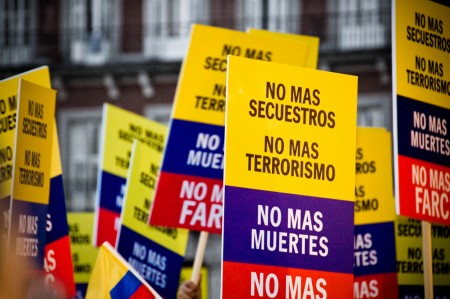
After eight consecutive years in office, President Álvaro Uribe of Colombia has to step down and make way for potential change in Colombian politics. This post features a brief description of the main presidential candidates in the 2010 elections and looks at the potential impact of a changed political landscape on relations with the US, Venezuelan President Hugo Chavez and the guerrilla organization FARC.
This weekend’s parliamentary election will serve as an indicator of the direction Colombian politics will take in the post-Uribe era.
Juan Manuel Santos Calderón is a member of the Social National Unity Party (Partido de “la U”). The former head of the Ministry of Defense announced that he would follow President Uribe’s policies and keep up good relations with the US. If so, Venezuela’s Hugo Chavez will have a rough time befriending Mr. Santos and the FARC will be confronted with a man who recently spearheaded military actions against the guerrilla organization. Mr. Santos enjoys the support of still very popular President Uribe as well as of many business leaders. According to recent polls, 23 percent of the people would like him to become president.
Gustavo Petro is the opposition’s most promising candidate and a member of the Alternative Democratic Pole (Polo Democrático Alternativo). The leftist politician once fought for the M-19 guerrilla movement before going into politics. However, he publicly stood up against FARC on various occasions. His economic policies are focused on issues of equality and supporting the (rural) poor, while he seems to oppose rent-seeking and the monopoly power of private corporations. In this sense, Mr. Petro may possibly find some common ground with President Chavez and the US may view his candidacy with discomfort. Currently, he is the runner-up to Mr. Santos with approximately 11 percent of potential votes.
Sergio Fajardo is an independent candidate and former city mayor of Medellín. He does not fully reject the possibility of renewed negotiations with FARC and Mr. Fajardo would rethink Colombia’s relation to the US, even though he clearly recognizes the US’ importance in fighting narco-trafficking. His external agenda prioritizes institutionalized instead of personalized relations. Under his presidency, Colombia would most likely slightly improve its relation to Venezuela, yet it would not become another Bolivarian nation. To date, his chances of winning the elections stand at about 9-10 percent.
Other candidates in the race are Noemí Sanin (Colombian Conservative Party/Partido Conservador Colombiano), Germán Vargas Lleras (Radical Change/Partido Cambio Radical), Andrés Felipe Arias (Colombian Conservative Party/Partido Conservador Colombiano) and Rafael Pardo (Colombian Liberal Party/Partido Liberal Colombiano). Mr. Pardo is another candidate from the opposition, whereas Ms. Sanin, Mr. Vargas and Mr. Arias are siding with President Uribe. Of these remaining candidates, only Ms. Sanin managed to overcome the 10 percent threshold in recent polls in February 2010.
Further information on the domestic conflict in Colombia:
- Time for a Peace Paradigm in Colombia (United States Institute of Peace)
- Bases, Bullets, and Ballots (Center for Global Development)
- Armed Conflict, Crime and Social Protest in South Bolivar, Colombia 1996-2004 (Crisis States Research Centre)
Further information on US-Colombian relations:
- A Summer Fling in South America: US Bases and a Weapons Race? (Portuguese Institute of International Relations and Security)
- Colombia: Issues for Congress (Congressional Research Service)
- The United States and Colombia: The Journey from Ambiguity to Strategy Clarity (Strategic Studies Institute, United States Army War College)
Background information on Colombian politics:


2 replies on “Preparing for Election Season in Colombia”
Noemí Sanín’s victory over Andrés Felipe Arias in the Conservative Party primaries again changes the starting situation for the presidential elections in May. Sanín, a former ambassador to the UK and Spain, foreign minister under President Gavíria, and presidential candidate in 1998 and 2002, is a well-known figure on the Colombian political arena, and she can count on a solid popular support. The general feeling in Colombia seems to be the wish for continuation of Uribe’s policies, especially the “democratic security and defence policy”. And although Juan Manuel Santos can be considered the “natural” candidate for this continuity, Sanín, who is also close to Uribe and his policies, will certainly challenge Santos already in the fisrt round.
Please also see my blog entry “Sweet Sour Colombian Democracy” on http://intlaffairs.wordpress.com/ for further discussion.
UNHCR recently released a report about human rights situation in Colombia.
Obviously non-state armed groups don’t get a good grade.
But the report also bluntly denounces the government’s persecution of human rights defenders. It even speaks about an “increase in threats and illegal use of intelligence services against human rights defenders and others”.
While the report is a nice windfall for the Polo Democratico Alternativo‘s campaign, the government doesn’t seem to think there is a problem.